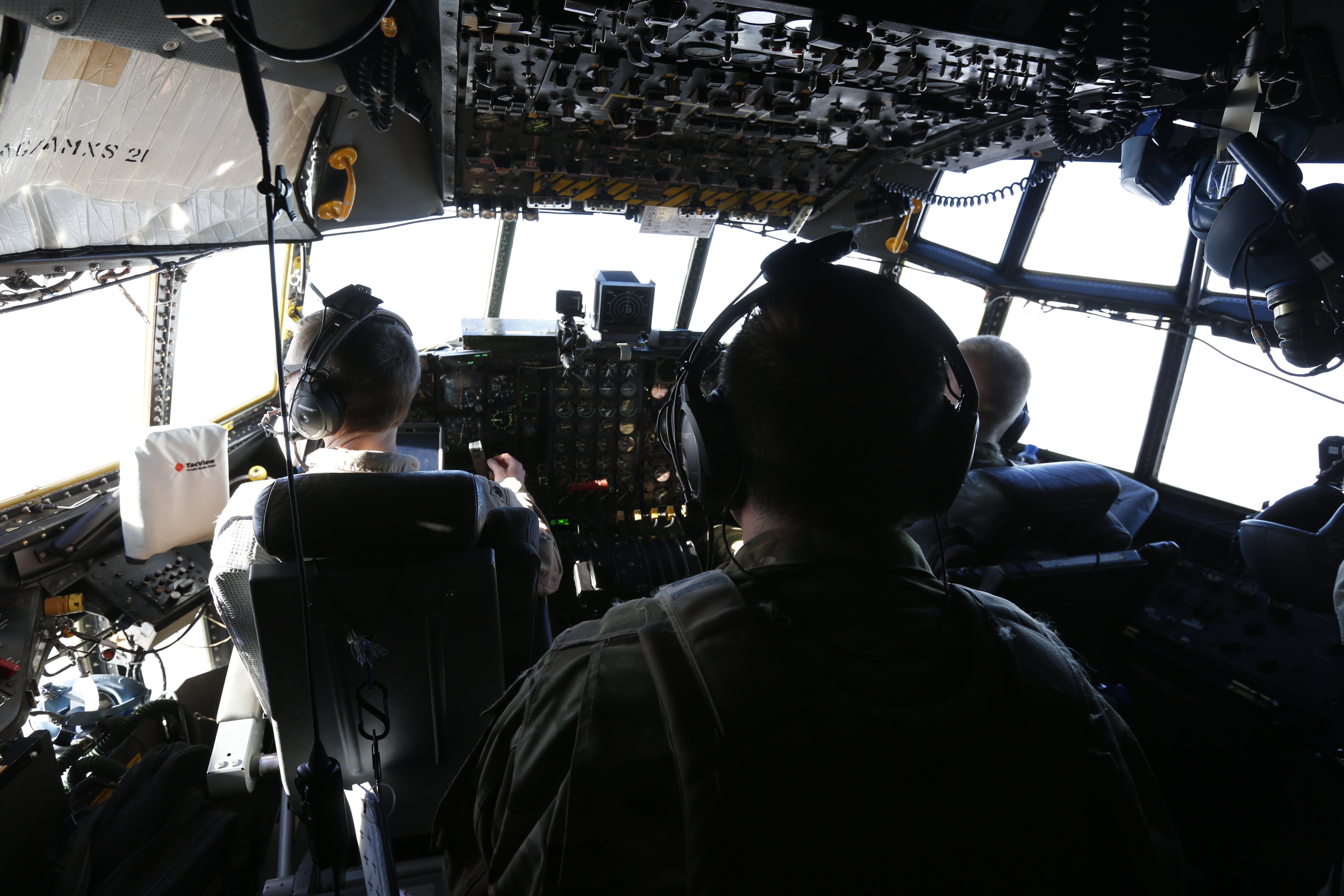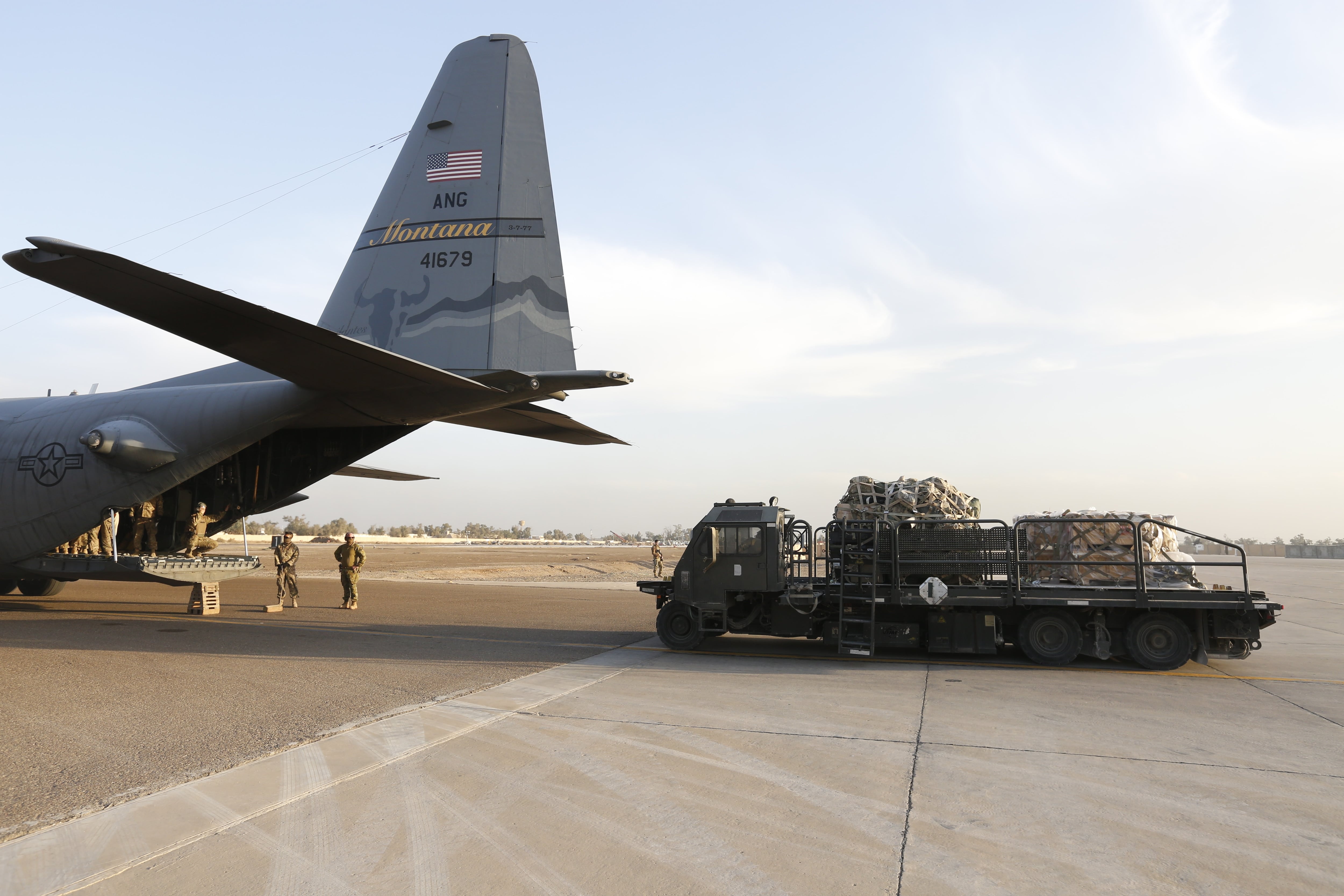CAMP TAJI, Iraq — It's an often unheralded and sometimes painful task, but the resupply missions conducted by the 386th Air Expeditionary Wing are critical to the fight against the Islamic State.
Some flights are quick, lasting just under four hours round-trip with just one stop on the way. But others have multiple stops and can take about 12 hours.
"We call it the Iraq pain train," said Tech. Sgt. Nathan Schultz, a loadmaster. "Those can be long and tedious. You're constantly loading, unloading, reconfiguring. A lot of times you'll get to the destination, you'll unload all your pallets, and then you'll have to bring on 50 people, [and] you'll have to put all the seats down. It can be a painful transition back and forth."
But the "pain train" is vital not just for logistical reasons such as resupplying bases with the parts needed to keep vehicles in good working order, Schultz said. They're also important for morale.
"Moving the passengers around allows them to have a little time to come back to other bases, resupply them, so they're not going to go a little crazy out there by themselves," Schultz said.
And when emergency strikes — such as the Islamic State's October destruction of a sulfur plant near Mosul, which spewed toxic clouds for days as it burned and sickened hundreds — logistics officers and transport aircraft work together to get life-saving supplies into the field as quickly as possible. In the case of the sulfur plant attack, this included scrambling to gather hundreds of gas mask filters for coalition forces at the nearby Qayyarah West Airfield, said Capt. Jeff Benson, a logistics officer assigned to Combined Joint Task Force-Operation Inherent Resolve.
Air crews from the 386th Air Expeditionary Wing conduct resupply missions every day.
Multiple times each day, huge C-130s and C-17s from the 386th are packed with cargo and personnel for flights into Iraq and other locations. The 386th flies about 475 cargo sorties per month, moving roughly 6,200 tons of cargo and 6,700 passengers monthly.
On Jan. 10, a C-130H crew from the 120th Airlift Wing of the Montana National Guard prepared for a flight to Camp Taji in Iraq, just north of Baghdad. The crew gathered in the aircrew flight equipment shop to grab flak jackets, night-vision goggles and other supplies they might need for their mission — including equipment they'd need if something went wrong, like small arms and ammunition, life rafts and life preservers.
This day, though, none of those emergency supplies would be needed — it would be a textbook supply run, encountering nothing more dangerous in the air than an Iraqi passenger Airbus.

Air crews fly in and out of Iraq daily to keep U.S. and coalition troops well supplied as part of Operation Inherent Resolve.
Photo Credit: Stephen Losey/Staff
Pilot Lt. Col. Pat Murphy and navigator Capt. Justin Hutchins pulled on helmets with night vision goggles attached and stepped inside booths with blackout curtains to test them. The crew went out to the flightline, where a K loader — a vehicle designed to move heavy cargo onto airplanes — pulled up with four big pallets of spare parts and medical supplies and a smaller pallet of mail. The C-130's ramp lowered and was braced with a wooden support called a "milk stool." After loadmasters moved the pallets over the rollers onto the plane and tightly secured the cargo, Tech. Sgt. Julie LaRocque, a crew chief, threw both her arms in the air and cheered.
Loadmasters such as Schultz are responsible for making sure all the cargo is properly secured -- some pallets are secured with locks on the C-130's rails, and other loose cargo such as baggage is usually secured with heavy straps — and balanced in the back of the plane, so the weight doesn't throw the plane off as it tries to take off and land. Loadmasters also ensure the passengers have the seats they need.
It's crucial to make sure cargo is locked down tight, Schultz said, because C-130s landing in Iraq often have to hit the brakes quickly.
"That's more of a danger than anything we've noticed in the air," Schultz said.

Airmen load up yet another supply flight on its way to Iraq. The flights take place multiple times a day and are critical to sustaining U.S. and coalition troops in the fight against the Islamic State.
Photo Credit: Stephen Losey/Staff
Schultz said his crew typically flies every other day.
"It's kind of boring, those days that we have off," Schultz said. "We'd rather be flying, but we need to have a day so that we can recuperate."
On the Jan. 10 flight, the trip to Iraq included a FAST — or Fly-Away Security Team — to guard the plane while it unloaded on the Taji runway. One of those FAST airmen, Tech. Sgt. Joseph Cull, wore a pink-and-black patch on his body armor, above pouches packed with spare ammunition, that combined the logos of the comic book vigilante the Punisher and Hello Kitty.
Shortly before takeoff, 11 soldiers from the Army's 86th Expeditionary Signal Battalion boarded and strapped themselves into their seats near the front of the cargo hold. Some soldiers folded their arms, lowered their heads and napped. Others pulled out their smartphones and put in their earbuds, or chewed tobacco, or shot the breeze with one another.
Army Sgt. Timothy Kovacs, 27, a team leader, said they had arrived in the region eight days earlier and were headed to Taji for about eight months to lay fiber optic cable there and at other forward operating bases throughout Iraq.
Kovacs said he was excited for his first deployment.
"I'm ready to get there," he said.
Someone on the flight mentioned going home in a few days. Spc. Laryssa Allen, 21, also on her first deployment, said, "I'm jelly. I wish I were home."
The others ribbed Allen for her homesickness — and for saying "jelly." She took the joking in stride, firing back: "It is a word! Look it up."
"You just got here," Spc. Alfredo Garza, 26, said with a laugh.
The soldiers let the kidding drop as the plane taxied to the runway and took off. Allen said something to Cpl. Gabriela Danielson, 24 years old and on her second deployment, who nodded. They leaned in close together, Allen held out her smartphone, and she took a selfie of their smiling faces as they flew off to their war.
Stephen Losey is the air warfare reporter for Defense News. He previously covered leadership and personnel issues at Air Force Times, and the Pentagon, special operations and air warfare at Military.com. He has traveled to the Middle East to cover U.S. Air Force operations.





